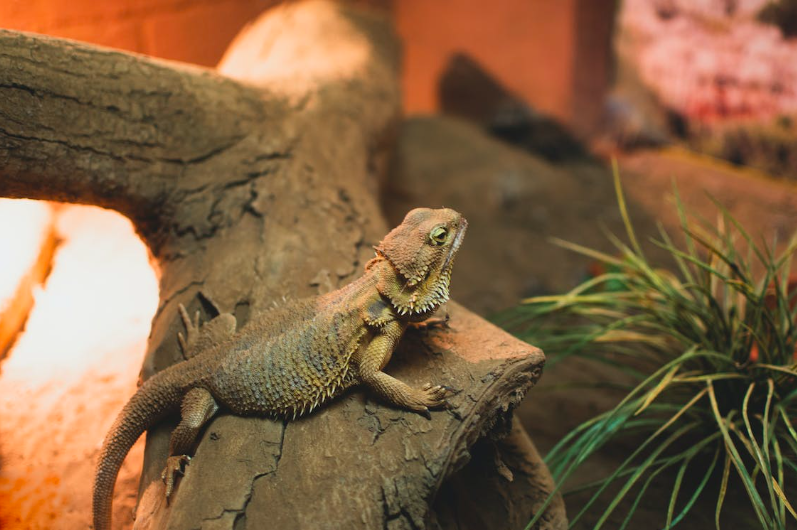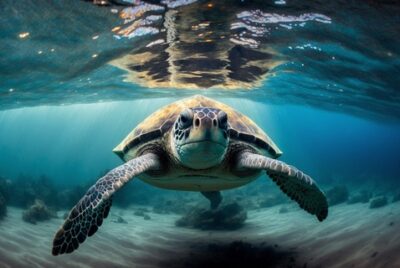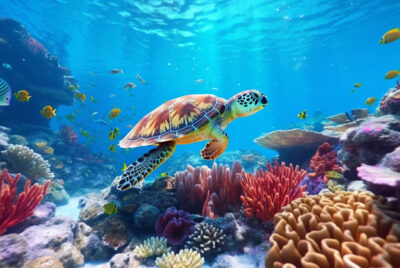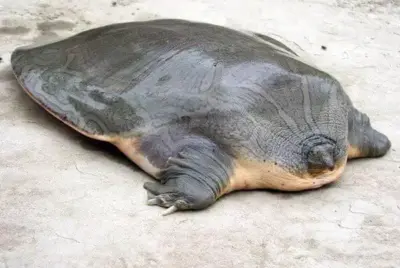The Bearded Dragon Diet: What Do Bearded Dragons Eat?
As an avid bearded dragon enthusiast, I can tell you that a balanced diet is vital for the health and wellbeing of these intriguing reptiles. Just like with humans, a bearded dragon diet needs a mix of proteins, vitamins, and minerals to stay active and healthy.
Like all animals and pets, there are also some foods to absolutely avoid feeding your baby dragon.
Let’s delve deeper into the dietary requirements of these amazing creatures.
Importance of a Balanced Diet for Bearded Dragons
Feeding your bearded dragon a balanced diet helps ensure they receive the essential nutrients required for growth, energy, and overall health. Moreover, an appropriate diet can prevent numerous health issues such as Metabolic Bone Disease and obesity. It can also help decrease the chance that a bearded dragon bites.
Nutritional Requirements for Bearded Dragon Diet
Understanding what nutrients are key to a bearded dragon diet can aid in creating a balanced diet, maximize their health, and maximize their lifespan.
Protein Source for Bearded Dragons
When it comes to providing a well-rounded and nutritious diet for your bearded dragon, protein sources play a crucial role in promoting their growth, muscle development, and overall health. Let’s delve deeper into the different protein sources that are beneficial for your bearded dragon and how to incorporate them into their diet effectively:
1. Feeder Insects: Feeder insects are the primary protein source for bearded dragons and should make up a significant portion of their diet. Here are some commonly used feeder insects:
- Crickets: Crickets are a staple insect in a bearded dragon’s diet. They are readily available, affordable, and provide a good balance of protein and essential nutrients. Choose appropriately-sized crickets based on the size of your dragon.
- Mealworms: Mealworms are another popular feeder insect. However, they should be offered in moderation due to their high-fat content. They are best used as occasional treats rather than a primary protein source.
- Dubia Roaches: Dubia roaches are highly nutritious and well-tolerated by bearded dragons. They have a softer exoskeleton compared to crickets, making them easier to digest. They provide a good balance of protein and contain essential vitamins and minerals.
- Black Soldier Fly Larvae: Black soldier fly larvae, commonly known as phoenix worms or calciworms, are highly nutritious and rich in calcium. They are an excellent choice for promoting bone health and can be offered to both baby and adult bearded dragons.
- Silkworms: Silkworms are soft-bodied insects that are gentle on a bearded dragon’s digestive system. They are highly nutritious and rich in protein, making them an excellent addition to their diet.
2. Gut-Loading and Supplementation: To ensure that feeder insects provide optimal nutrition for your bearded dragon, it’s essential to practice gut-loading. Gut-loading involves feeding nutritious foods to the insects before offering them to your dragon. This process enhances the nutritional content of the insects and ensures that your dragon receives a well-rounded diet.
In addition to gut-loading, it’s crucial to dust feeder insects with calcium and vitamin supplements. Calcium is essential for bone health and preventing conditions like Metabolic Bone Disease (MBD). Look for reputable reptile-specific calcium and multivitamin supplements and follow the recommended dosage instructions.
3. Variety and Rotation: To provide a diverse and balanced diet for your bearded dragon, it’s important to offer a variety of feeder insects. Each insect species has a slightly different nutritional profile, so incorporating different insects ensures that your dragon receives a range of essential nutrients. Rotating the types of insects you offer can also prevent your dragon from developing a preference for one type of food and encourage them to eat a wider variety of prey.
4. Consider Size and Age: When selecting feeder insects for your bearded dragon, it’s important to consider their size and age. Feeder insects should be appropriately sized for your dragon to prevent choking or digestive issues. For baby bearded dragons, choose smaller-sized insects that they can easily consume. As your dragon grows, gradually increase the size of the insects to match their developmental stage.
5. Quality and Safety: Always ensure that the feeder insects you offer to your bearded dragon are of high quality and free from pesticides or other harmful substances. Avoid collecting insects from the wild as they may be exposed to pesticides or parasites. Instead, rely on reputable suppliers that specialize in breeding and providing healthy feeder insects.
By incorporating a variety of protein-rich feeder insects, practicing gut-loading and supplementation, and considering the size and age of your bearded dragon, you can ensure that they receive the necessary protein and nutrients for their overall health and
Vegetables and Fruits in Bearded Dragons’ Diet
In addition to protein sources, a well-rounded and nutritious diet for your bearded dragon should include a variety of vegetables and fruits. These plant-based foods provide essential vitamins, minerals, and fiber, contributing to your dragon’s overall health and well-being. Let’s explore the importance of incorporating vegetables and fruits into your bearded dragon’s diet and discuss some suitable options:
1. Dark, Leafy Greens: Dark, leafy greens are a vital component of a bearded dragon’s diet and should make up a significant portion of their vegetable intake. These greens provide essential nutrients such as calcium, vitamin A, and fiber. Here are some examples of nutritious dark, leafy greens for your dragon:
- Collard Greens: Collard greens are an excellent source of calcium, vitamin A, and vitamin K. They are low in oxalates, making them a suitable choice for regular consumption.
- Mustard Greens: Mustard greens are rich in vitamin A, vitamin C, and calcium. They have a slightly spicy flavor that some dragons may enjoy.
- Dandelion Greens: Dandelion greens are highly nutritious and contain beneficial antioxidants. They are also a natural source of calcium.
- Turnip Greens: Turnip greens are packed with vitamins A, C, and K, as well as calcium. They have a slightly bitter taste that may require some acclimation for your dragon.
2. Other Vegetables: In addition to dark, leafy greens, bearded dragons can benefit from a variety of other vegetables. These can provide additional vitamins and minerals while adding diversity to their diet. Here are some suitable vegetables to include:
- Bell Peppers: Bell peppers, especially red and yellow varieties, offer vitamin C and beta-carotene. They add vibrant colors to your dragon’s diet.
- Squash: Squash varieties like butternut, acorn, and zucchini provide vitamins A and C, as well as dietary fiber.
- Carrots: Carrots are a good source of beta-carotene, which is converted to vitamin A in the body. Grated or finely chopped carrots are easier for dragons to consume.
- Green Beans: Green beans offer vitamins A, C, and K, as well as dietary fiber. Steam or lightly cook them to improve digestibility.
3. Fruits: While fruits should be given in moderation due to their higher sugar content, they can serve as occasional treats and sources of additional nutrients for your bearded dragon. Here are some suitable fruits to offer:
- Papaya: Papaya is a tropical fruit that provides vitamin C, vitamin A, and digestive enzymes. Remove the seeds and offer small, bite-sized pieces.
- Blueberries: Blueberries are rich in antioxidants and provide vitamins C and K. Offer them as occasional treats due to their small size.
- Melons: Melons such as cantaloupe and watermelon can be refreshing treats for your dragon. Remove seeds and rind and offer in small portions.
- Apples: Apples are a good source of fiber and vitamin C. Remove seeds and core, and offer small pieces with the skin.
4. Preparation and Presentation: When offering vegetables and fruits to your bearded dragon, it’s important to prepare them appropriately. Wash all produce thoroughly to remove any pesticides or contaminants. Cut them into manageable sizes, ensuring they are bite-sized for your dragon. Some dragons prefer shredded or finely chopped vegetables, while others may prefer larger pieces. Observe your dragon’s preferences and adjust the presentation accordingly.
5. Experimentation and Variety: Just like humans, bearded dragons have individual preferences for certain vegetables and fruits.
Building a Healthy Bearded Dragon Diet
Getting the right balance between insects and greens can be a juggling act, especially considering the difference in dietary needs between babies and adults.
The Ratio of Insects to Greens
A good rule of thumb for bearded dragons’ diet is the 80/20 rule. Baby bearded dragons should eat 80% insects and 20% greens. Adult bearded dragon diets should be 80% greens and 20% insects.
Diet for Baby Bearded Dragons
Baby bearded dragons are fast growers and need more protein, hence the higher percentage of insects in their diet.
As a responsible bearded dragon owner, it’s important to provide proper nutrition to your baby dragon during their early stages of growth. A well-balanced diet is essential for their overall health, development, and future well-being. Here are key considerations for a baby bearded dragon’s diet:
1. High-Protein Diet: During their early stages of life, baby bearded dragons have rapid growth and higher protein requirements. Their diet should consist of approximately 80% protein sources and 20% vegetables. Adequate protein is crucial for muscle development and overall growth.
2. Feeder Insects: Feeder insects are the primary source of protein for baby bearded dragons. Suitable options include appropriately-sized crickets, small dubia roaches, and phoenix worms (black soldier fly larvae). These insects provide essential nutrients, such as protein and calcium, necessary for the healthy development of your baby dragon.
3. Proper Gut Loading: Ensure the feeder insects are well-fed and gut-loaded with nutritious food before offering them to your baby bearded dragon. Feeder insects that have been adequately gut-loaded with nutrient-rich foods will pass on these beneficial nutrients to your dragon, enhancing their overall diet.
4. Variety in Insects: Introduce a variety of feeder insects to provide a diverse nutrient profile. This can include small mealworms, silkworms, and appropriately-sized waxworms. Rotating the types of insects will ensure your baby bearded dragon receives a range of nutrients and prevents them from developing a preference for one type of insect.
5. Calcium and Vitamin Supplements: Calcium is crucial for the healthy development of your baby bearded dragon’s bones and to prevent conditions like Metabolic Bone Disease (MBD). Dust the feeder insects with a calcium supplement before feeding to ensure your baby dragon receives adequate calcium intake. Additionally, provide a reptile-specific multivitamin supplement a few times a week to ensure they receive a broad spectrum of essential vitamins and minerals.
6. Introduction of Vegetables: While protein sources make up the majority of a baby bearded dragon’s diet, it’s also important to introduce vegetables early on. Offer finely chopped or shredded dark, leafy greens such as collard greens, mustard greens, and dandelion greens. Start with small amounts and gradually increase the portion size as they grow.
7. Hydration: Proper hydration is crucial for your baby bearded dragon’s health. They may obtain moisture from the food they eat, but it’s also important to provide access to fresh water. Use a shallow dish for water, ensuring it is shallow enough to prevent accidental drowning. Monitor their water intake and ensure it remains clean and accessible at all times.
8. Frequency of Feeding: Baby bearded dragons have high metabolic rates and require frequent feeding. Offer them small meals 2-3 times a day. This ensures they receive the necessary nutrients and energy for their growth and development. Adjust the feeding schedule as they grow older and their dietary needs change.
9. Monitoring Growth and Health: Regularly monitor your baby bearded dragon’s growth and overall health. Observe their behavior, appetite, and body condition. If you notice any significant changes, consult with a reptile veterinarian to ensure their diet and care are appropriate.
Providing a well-balanced diet consisting of high-quality feeder insects, proper gut-loading, calcium and vitamin supplementation, gradual introduction of vegetables, and maintaining proper hydration will support the healthy growth and development of your baby bearded dragon. Remember to provide a clean and stimulating environment and consult with a reptile veterinarian for personalized guidance.
Diet for Adult Bearded Dragons
As your bearded dragon transitions into adulthood, their dietary needs evolve, requiring adjustments to their feeding routine and food composition. Providing a well-balanced diet during this stage is crucial to maintaining their overall health and ensuring they receive the necessary nutrients. Let’s explore the key considerations for an adult bearded dragon’s diet:
1. Emphasizing Vegetables: Adult bearded dragons should have a higher proportion of vegetables in their diet compared to protein sources. The ideal ratio for adult dragons is approximately 80% greens and 20% protein. This shift in ratio reflects their reduced need for rapid growth and increased focus on maintaining a healthy weight.
2. Variety of Vegetables: To meet their nutritional requirements and add variety to their diet, offer a wide range of vegetables. Dark, leafy greens should remain a staple, as they provide essential vitamins and minerals. Additionally, incorporate other vegetables like bell peppers, squash, carrots, and green beans to provide additional nutrients and flavors.
3. Protein Sources: While the proportion of protein sources decreases for adult dragons, they should still receive a moderate amount to support muscle maintenance and other essential bodily functions. Feeder insects like crickets, dubia roaches, and black soldier fly larvae continue to be suitable options. Offer protein sources as part of their regular feeding schedule, but in smaller quantities compared to their younger counterparts.
4. Calcium and Vitamin Supplements: Adult bearded dragons still require adequate calcium to maintain strong bones and prevent conditions like Metabolic Bone Disease (MBD). Continue dusting their food with a calcium supplement, preferably one specifically formulated for reptiles. Additionally, consider providing a multivitamin supplement to ensure they receive a broad spectrum of essential vitamins and minerals.
5. Hydration and Water Intake: While bearded dragons do not typically drink water from a bowl, hydration is still important. Adult dragons can obtain moisture from the food they consume, particularly from their vegetable intake. To encourage hydration, mist their greens with water before feeding or provide occasional baths to allow them to absorb water through their skin.
6. Avoiding Excessive Treats: As bearded dragons reach adulthood, it’s important to avoid overindulging them with treats, including fruits. While fruits offer beneficial nutrients, they are higher in sugar and should be offered sparingly. AS mentioned earlier, stick to the 80/20 ratio of greens to protein and limit treat consumption to maintain a healthy weight and avoid potential digestive issues.
7. Monitoring Weight and Health: Regularly monitor your adult bearded dragon’s weight and overall health. Adjust their diet and feeding schedule accordingly to maintain a healthy body condition. If you notice significant weight gain or loss, consult with a reptile veterinarian to ensure there are no underlying health concerns.
8. Environmental Enrichment: In addition to their diet, provide environmental enrichment for adult bearded dragons. Encourage exercise and mental stimulation through supervised outside-of-cage time, climbing structures, and interactive toys. An enriched environment promotes overall well-being and can positively impact their appetite and digestion.
By maintaining a balanced diet consisting primarily of vegetables, incorporating appropriate protein sources in moderate quantities, and ensuring adequate hydration and supplementation, you can provide your adult bearded dragon with the nutrition they need for a healthy and fulfilling life.
Hydration for Bearded Dragons
Bearded dragons don’t drink water like other pets. Instead, they primarily hydrate through their food. Misting their greens before feeding is a good practice.
Hazardous Foods for Bearded Dragons
Every bearded dragon enthusiast should be aware of the food items that could potentially harm their scaly friends. Some foods, while seemingly harmless, can pose severe risks to the health of your bearded dragon.
Toxic Foods
Certain foods are toxic to bearded dragons and can lead to serious health issues or even death. It’s important to keep this completely out of your bearded dragons diet.
- Fireflies: These insects are deadly to bearded dragons. Even one firefly can kill a bearded dragon.
- Outdoor Insects: Avoid feeding these to your bearded dragon, as they may have been exposed to pesticides.
- Avocado: This fruit is highly toxic to bearded dragons. Its consumption can lead to cardiac arrest.
- Rhubarb: This plant contains high levels of oxalic acid, which can cause kidney failure in bearded dragons.
Foods to Avoid
Even if some food items are not outright toxic, they may still be unhealthy for bearded dragons.
- Lettuce: Although not harmful per se, lettuce (especially iceberg) is nutritionally poor and high in water. It provides very little value to a bearded dragon’s diet.
- Insects with hard shells: Some insects like beetles and centipedes have hard exoskeletons, which can be challenging for bearded dragons to digest.
- Raw Meat & Seafood: Raw meat and seafood can harbor bacteria and parasites that are harmful to bearded dragons.
- Dairy Products: Bearded dragons cannot digest lactose present in dairy products.
Hazardous Fruits and Vegetables
Some fruits and vegetables can be harmful to bearded dragons if fed excessively due to high levels of certain nutrients or compounds.
- Spinach, beet tops, and Swiss chard: These vegetables are high in oxalates, which bind calcium and can lead to calcium deficiencies if fed regularly.
- Citrus fruits: These fruits have high acidity that can upset a bearded dragon’s stomach.
- Fruits high in sugar: Fruits like bananas, grapes, and apples can cause digestive issues if fed too often due to their high sugar content.
For more information on specific fruits and vegetables, click the links below:
Can Bearded Dragons Eat Tomatoes?
Can Bearded Dragons Eat Strawberries
Can Bearded Dragons Eat Spinach?
Can Bearded Dragons Eat Bananas?
Bearded Dragon Diet: Can Bearded Dragons Eat Apples?
Can a Bearded Dragon Eat Grapes? What Fruits Can They Eat?
By avoiding these hazardous foods and focusing on a diet rich in the right nutrients, you can ensure your bearded dragon lives a healthy, happy life.
Tips for Feeding Your Bearded Dragon
- Always provide fresh food: The fresher the food, the higher the nutritional content.
- Monitor their appetite: Changes in eating habits can indicate health issues.
- Gut load insects: Feeding nutritious food to the insects before offering them to your bearded dragon increases their nutritional value.
- Dust insects with calcium and vitamin supplements: This helps prevent Metabolic Bone Disease.
Conclusion
Understanding and providing the right diet for your bearded dragon is essential for their health and longevity. From the appropriate protein sources to the vital veggies and fruits, to understanding hydration and hazardous foods, being informed is key. Checking your bearded dragons poop now and then also never hurts. Remember, every dragon is unique and may have individual preferences and needs.
FAQs
- Can bearded dragons eat raw meat? No, raw meat isn’t appropriate for bearded dragons. They are primarily insectivores and herbivores.
- How often should I feed my bearded dragon? Babies should eat 2-3 times daily, while adults should be fed once daily.
- Is it safe to feed my bearded dragon wild insects? No, wild insects might be exposed to pesticides, which can harm your pet.
- How often should I provide fruits to my bearded dragon? Fruits should be part of a bearded dragon’s diet but in moderation, usually as treats.
- Can I feed my bearded dragon only vegetables? No, while veggies are essential, bearded dragons also need protein from insects, especially when they are young.




